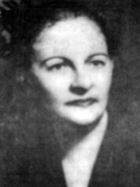Elida Campodónico facts for kids
Quick facts for kids
Elida Campodónico
|
|
|---|---|
 |
|
| Born |
Elida Luisa Campodónico Moreno
6 August 1894 Macaracas, Los Santos Province, Department of Panama, Colombia
|
| Died | 6 January 1960 (aged 65) Panama City, Panama
|
| Nationality | Panamanian |
| Other names | Elida Luisa Campodónico de Crespo |
| Occupation | teacher, women's rights advocate, attorney |
| Years active | 1919–1960 |
| Known for | First woman ambassador in Latin America |
Elida Luisa Campodónico Moreno (born August 6, 1894 – died January 6, 1960) was a very important Panamanian teacher, lawyer, and champion for women's rights. She helped start the National Feminist Party of Panama and worked hard to make sure women could vote. She also set up a group called La Gota de Leche, which helped feed children who didn't have enough to eat. Elida was the second woman in Panama to become a lawyer. After women finally won the right to vote, Campodónico became the first woman ambassador in Latin America, representing Panama in Mexico in 1952.
Contents
Early Life and Education
Elida Luisa Campodónico Moreno was born on August 6, 1894, in Macaracas, a town in what was then the Department of Panama, Colombia. Her mother was Panamanian, and her father was a merchant from Italy. When Elida was nine years old, in 1903, Panama became an independent country, separating from Colombia.
She finished her first years of school in La Villa de los Santos. Then, she moved to Panama City to attend Santa María, a Catholic school for girls. Later, Elida and her brother, Domiluis, traveled all the way to Bellinzona, Switzerland, to study education. In 1919, she earned a master's degree in education. This allowed her to teach kindergarten and primary school. She also received certificates to teach French, Italian, and Spanish.
When she returned to Panama City, she started teaching geography and history at a teacher's training school. She soon married José Daniel Crespo, who was also an educator. Because their teaching ideas were considered too modern, they were both fired from the school. Together, they opened the first school in Panama to train kindergarten teachers. This school used the Montessori method, which is a special way of teaching that helps children learn by doing things themselves. They ran the school from their own home.
Fighting for Women's Rights
In 1923, Elida Campodónico joined with other strong women like Clara González and Sara Sotillo to create the National Feminist Party (PNF). They also formed the National Society for Women's Progress. Elida became the Vice President of the PNF.
The next year, these women started the School of Feminist Culture. Here, they gave talks on important topics like civics, history, and politics. Their goal was to help women get ready to take part in professional jobs and in society. All these groups worked to open up opportunities for women in Panama, including in civil life, the economy, and politics. During this time, Campodónico also helped set up a Panamanian branch of La Gota de Leche. This organization provided milk to children who were not getting enough to eat.
Becoming a Lawyer and Campaigning for Votes
In the 1930s, after having four children, Elida decided to study law. She attended the Free School of Law in Panama. In 1935, she became the second Panamanian woman to earn a law degree. The first was Clara González. Elida wrote her law thesis on "The Crime of Women in Panama."
As a lawyer, Campodónico fought for the rights of women and children. She was a strong supporter of women's suffrage, which means the right for women to vote. She even started and edited a journal called Feminist Renewal. With other feminists, she gathered 2,000 signatures and presented a petition to the National Assembly of Panama. They demanded the right for women to vote. They also asked for changes to the laws to create a special court system for young people, industrial schools, and laws to protect working women.
Their requests were not immediately granted. However, a law was passed that allowed citizens to get an identity card. The National Feminist Party demanded these cards for their members. In 1936, when Campodónico, González, and another leader protested because they couldn't get identity cards, a government official famously told them, "In Panama there are no female citizens, only male citizens."
In response, the PNF sent another petition to the National Assembly to change the election laws, but it didn't move forward. The women were frustrated. They planned to hold a big meeting in 1938 to work on changing the legal code, but President Arosemena stopped it.
In July 1941, some laws were passed that took away Panamanian women's full citizenship. However, they were given limited voting rights in local councils if they could read and write. Later in 1941, there was a change in government, and a new group was needed to write the country's laws. On December 31, 1944, Clara González started the National Women's Union (UNM), with Campodónico on its board. Finally, women in Panama won the right to vote!
Government Roles and Later Life
After women gained the right to vote, Elida Campodónico was appointed to the Ministry of Foreign Affairs for the National Women's Union. She also worked as a legal representative for several worker groups, including the Panamanian Teachers Union.
In 1952, she made history when she was appointed as the first woman ambassador in Latin America. She served as Panama's ambassador to Mexico. After she retired from her diplomatic work, she returned to Panama. She worked in business until her death on January 6, 1960, in Panama City.
See also
 In Spanish: Elida Campodónico para niños
In Spanish: Elida Campodónico para niños
 | Roy Wilkins |
 | John Lewis |
 | Linda Carol Brown |

